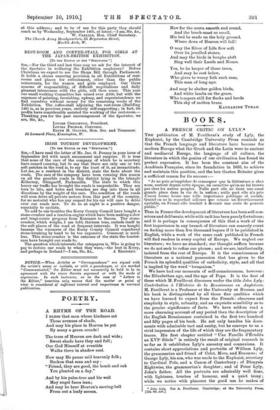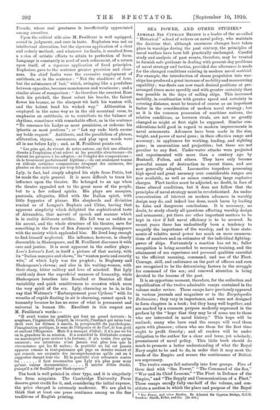BOOKS.
A FRENCH CRITIC ON LYLY.*
THE publication of M. Fenillerat's study of Lyly, the Euphuist, by the Cambridge University Press reminds is that the French language and literature have become for modern Europe what the Greek and the Latin were to ancient and mediaeval Europe, the language of all culture, the
literature in which the genius of our civilisation has found its perfect expression. It has been the constant aim of the Academie Francaise, since its foundation in 1635, to achieve and maintain this position, and the late Gaston Boissier gives a sufficient reason for its success :-
" Je ne puis m'empecher de remarquer qua la litterature a chez nous, surtont depnis cette epoque, un caractbre qu'on ne lui tronve pas chez les autres peuples. Nulls part elle ne tient une aussi grand° place dans la vie de in nation ; nulle part elle n'a pris d'aussi bonne heure une telle importance politique et sociale. Quand on ne la regardait ailleurs quo comma un divertissement agreable, en France elle tendait h devenir une sorte de pouvoir public."
Thus in France the development of literature has been self-con- scious and deliberate, while with us it has been purely fortuitous; and it is perhaps in consequence of this that a work of the first importance in any branch of literature can scarcely count on finding more than five thousand buyers if it be published in English, while a work of the same rank published in French will find readers in every capital of Europe. We neglect our literature; we have no standard; our thought suffers because we do not seek to refine our phrase ; and we are, intellectually,
isolated from the rest of Europe. It is the consciousness of literature as a national possession that has given to the French its splendid qualities of catholicity, style, and all that is implied by the word " humanism."
We have had our moments of self-consciousness, however :
the Elizabethan age, and the age of Pope. It is the first of these which M. Feuillerat discusses under the title Tohn Lyly: Contribution a l'Histoire de la Renaissance en Angleterre. M. Feuillerat is a Professor at the University at Rennes, and his book is distinguished by all those fine qualities which we have learned to expect from the French : clearness and simplicity in style, urbanity, and an exquisite sensibility as to
the precise significance of facts. We have seldom read a more charming account of any period than the description of the English Renaissance contained in the first two hundred
and fifty pages of his book. He not only handles his docu- ments with admirable tact and sanity, but he conveys to us a vivid impression of the life of which they are the fragmentary
traces. His first chapter entitled " Une Famine d'Erudits au XVP Siecle " is entirely the result of original research in so far as it establishes Lyly's ancestry and connexions. It contains short appreciations and portraits of William Lyly, the grammarian and friend of Colet, More, and Erasmus ; of George Lyly, his son, who was uncle to the Euphnist, secretary to Cardinal Pole, and a Canon of Canterbury ; of Dionysia Rightwise, the grammarian's daughter ; and of Peter Lyly, John's father. All the portraits are admirably well done, with lightness, touches of humour, and a quiet irony ; while we notice with pleasure the good use he makes of
• John Lyle. Par A. Pen:Herat. Cambridge: at the University Press. [Me. 6d. net.]
Fronde, whose real greatness is insufficiently appreciated among ourselves.
Upon the critical side also M. Feuillerat is well equipped, sound in judgment, and sure in taste. Euphuism was not an
intellectual aberration, but the rigorous application of a clear and orderly method ; and whatever its faults, it resulted from a Kries of artistic efforts to attain to perfection of form. Language is constantly in need of such refinement, of a return upon itself, of a rigorous application of fixed principles. Euphuism gave to the sentence greater precision and clear- ness. Its chief faults were the excessive employment of antithesis, as in the sentence : " Not the shaddowe of loue, but the substaunce of lust," which, swinging like a pendulum between opposites, becomes monotonous and wearisome ; and a similar abuse of comparison : " As therefore the sweetest Rose bath his prickell, the finest veluet his bracke, the fairest flower his branne, so the sharpest wit hath his wanton will, and the holiest head his wicked way." Alliteration is employed in the same way as in the old accentual verse, to emphasise an antithesis, or to contribute to the balance of rhythms, sometimes with remarkable effect, as in the sentence " To renounce his Ladye as most pernicious, or redeeme his lybertie as most pretious " ; or " Let my rude birth excuse my bolde request." Antithesis, and the parallelism of phrase,
alliteration, rhyme, assonances, and play upon words were all in use before Lyly ; and, as M. Feuillerat points out,
" Les gem qui, du vivant de notre anteur, ont fait une allusion directe it l'euphuism n'ont releve ni les procedes structuraux—ils 6taient lea premiers a les adopter,—ni l'emploi des comparaisons- Us le trouvaient parfaitement legitime ;—ils ont seulement tourne en ridicule certaines comparaisons evoquant des animaux, des plantes ou des mineraux par trop fabuleux."
Lyly, in fact, had simply adopted his style from Fettle, but he made the style general. It is more difficult to trace his influence upon the theatre. He belonged to an age when the theatre appealed not to the great mass of the people,
but to a few refined spirits. His plays are masques, pastorals, allegories, filled with the Italian spirit, with little fopperies of phrase. His shepherds and divinities remind us of Longus's Daphnis and Chloe, having that apparent simplicity which delighted the sophisticated taste of Alexandria, that naivete of speech and manner which is in reality deliberate artifice. His fall was as sudden as his ascent, and the whole structure of his theatre, save for something in the form of Ben Jonson's masques, disappears with the society which applauded him. He lived long enough
to find himself neglected. His influence, however, is clearly discernible in Shakespeare, and M. Feuillerat discusses it with
care and justice. It is most apparent in the earlier plays : Love's Labour's Lost, in itself a picture of that society, with its "Italian masques and shows," its "wanton poets and courtly wits," of which Lyly was the prophet ; in Dogberry and Shakespeare's clowns ; and also in his waiting-women, with their sharp, bitter raillery and love of mischief. But Lyly could only draw the superficial manners of humanity, while Shakespeare breathes into Rosalind or Beatrice all that variability and quick sensitiveness to occasion which seem the very spirit of the sex. Lyly, charming as he is, in the way that Watteau's " Embarquement pour Cythere " with its wreaths of cupids floating in air is charming, cannot speak to humanity because be has no sense of what is permanent and universal in human life. Excellent in this respect are
M. Feuillerat's words :- "B await toutes les qualites qui font un grand ecrivain : In sonplesse, ringeniosite, resprit, la vivacite, rinstinct qui mene tout droit vers lee; themes it succes, In perspieacite du psychologue, rimagination poetique, le sena de relegance et de Fart, le bon gait et surtout reloquence. ATMs it a manqué d'ideal ; it n'a pas eu foi en In grandeur de sa mission. Il a considers la littkrature comme un marchepied pour arriver a la fortune; voulu etre qu'un amuseur ; ses intentions n'ont jamais vise plus loin que la circonstanco qui les fit nitre; la posterite ne lui eat jamais apparue comme la tout-puissance qui juge en dernier ressort et qui console ses croyants des incomprehensions qu'ils ont eu supporter durant lour vie. Et In posterite s'est retournee centre
lui it faut reconnoitre qua Lyly n'a plus pour nous qu'une valeur documentaire Ii merite d'être etudie, puisqu'il a ete feuillete par Shakespeare."
The book is well printed in clear type, and it is singularly free from misprints. The Cambridge University Press deserve great credit for it, and, considering the initial expense, the price charged is extremely moderate. We are glad to think that at least one press continues among us the fine traditions of English printing.







































 Previous page
Previous page